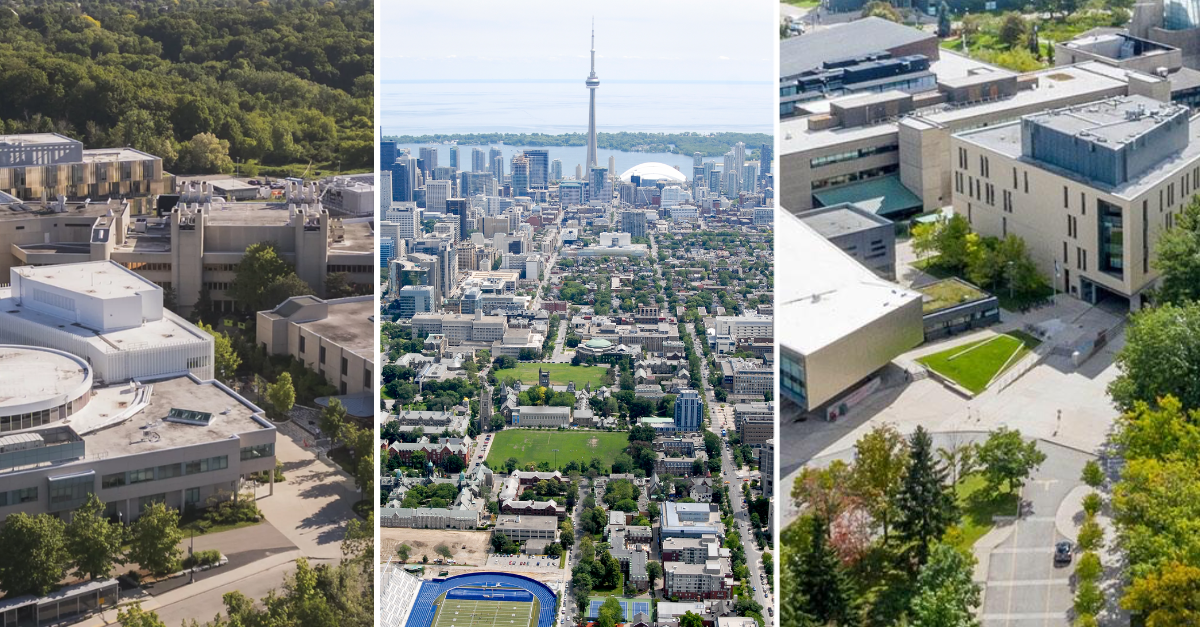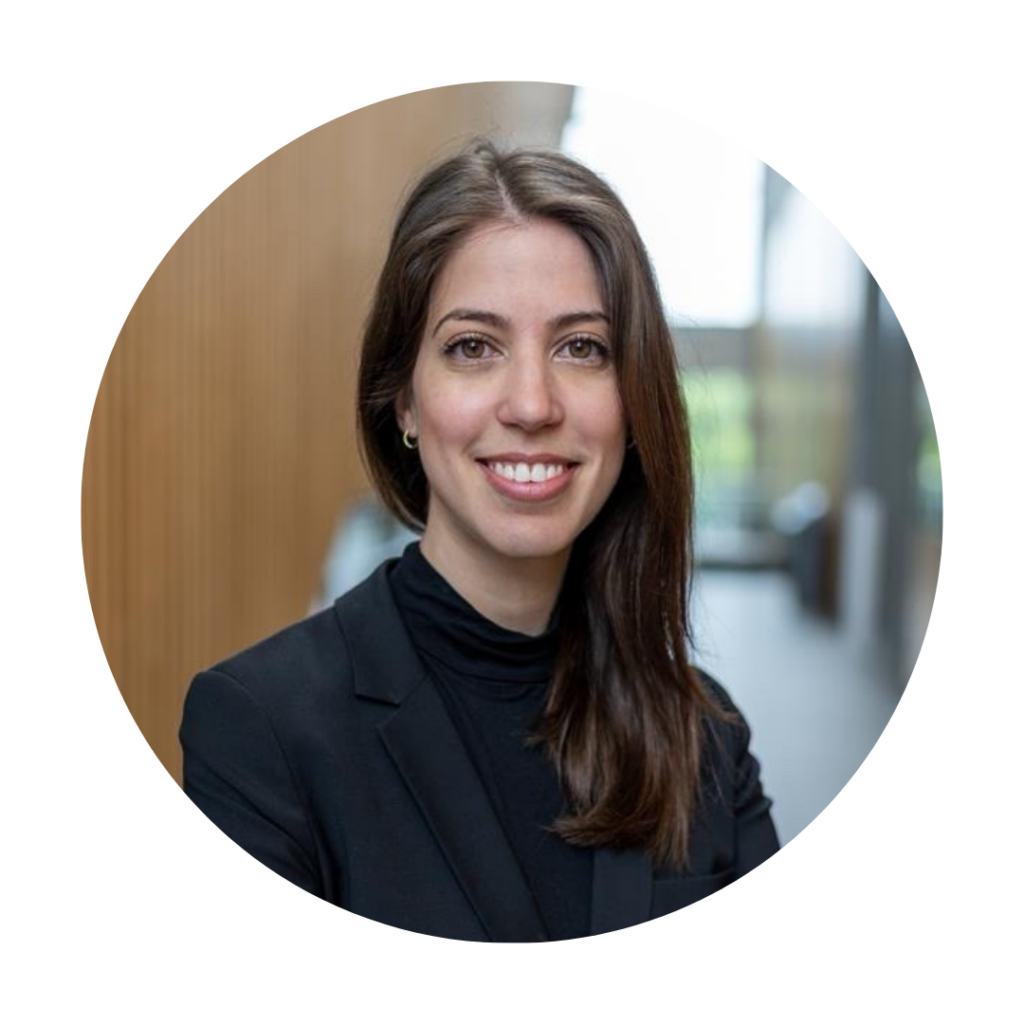
It's Sustainability Week at U of T, the world’s most sustainable university. Sustainability Office staff from the University of Toronto Scarborough (UTSC), St. George (UTSG) and Mississauga (UTM) sat down together to catch up on all things sustainability happening across all three campuses.
Nadine, UTSC: This is so fun to chat like this! Kaitlyn, why don’t you get us started and tell us about Sustainability Week?
Kaitlyn, UTSG: Absolutely! Each campus is hosting Sustainability Week events, from March 17 to March 21. At these events, you can learn about different sustainability careers, hear from leaders at U of T’s Institute for Environment, Conservation and Sustainability, attend a Repair Cafe and more! Find the full list of events here – UTSG, UTM, UTSC. Let’s turn to UTSC. The campus recently released its five-year Energy Conservation and Demand Management Plan. What are some highlights?
Nadine: Our Energy Conservation Plan outlines a 37% emissions reduction by 2030. Since 2014, we’ve cut emissions per building by 8.7% through energy-efficient building upgrades and retrofits. One significant milestone was the Harmony Commons’ certification we received as Canada’s largest Passive House-certified residence, designed for minimal energy use.
We also launched a reusable food container program, reusing 9,514 containers—saving 1,598 kg of emissions and 77,009 litres of water. Additionally, in its first year, our bikeshare program had 531 rentals. Supporting SDG 15: Life on Land, we partnered with the Nikibii Dawadinna Giigwag Indigenous youth program and planted 300 trees and shrubs, boosting campus biodiversity.
Samantha, UTM: That’s impressive! Over at UTSG, I understand Project Leap is making waves in emissions reduction. Can you tell us more, Natalie?
Natalie, UTSG: Absolutely. Project Leap will cut Scope 1 and 2 emissions by 50% by 2027. We’ve already made significant progress: we’ve decommissioned one natural gas boiler, which will be replaced by two electric boilers. We’ve also completed lighting upgrades in several buildings. Canada’s largest urban geoexchange system, beneath King’s College Circle, is also being integrated with Project Leap. The initiative supports SDG 7: Affordable and Clean Energy.
Kaitlyn: Beyond infrastructure, engagement is a key priority. In support of SDG 12: Responsible Consumption and Production, we launched our Free Store this October, which diverted over 1,200 kg of material from landfills in its first two months. We also held over 20 events, including our first-ever Sustainability Week, and engaged more than 300 visitors in guided tours of our geoexchange system. We’ve also expanded our research, learning and commercialization efforts, utilizing our campus as a living lab for further innovation.
Nadine: That’s great. The tri-campus is committed to becoming climate positive by 2050. I understand UTM recently released its own Climate Positive Plan. Can you tell me more about that?
Samantha: Supporting SDG 13: Climate Action, UTM’s Climate Positive Plan highlights the initiatives and strategies to transform infrastructure that will change how the campus consumes, distributes and produces electricity. UTM’s newest building, the New Science Building (NSB) demonstrates UTM’s commitment to sustainable design as one of the most energy-efficient laboratory facilities in North America. Additionally, Project SHIFT details how UTM is shifting away from fossil fuels as a primary heating source with a plan to complete deep energy retrofits across campus.
Kaitlyn: Lots of momentum here. What’s next for 2025?
Nadine: We’re looking forward to increasing our waste diversion rate and expanding our reusable container program.
Samantha: This year marks the halfway point of UTM’s Sustainability Strategic Plan, a foundational roadmap designed to align with the UN SDGs and the Association for the Advancement of Sustainability in Higher Education Sustainability, Tracking, Assessment and Rating System (STARS 2.2). With notable progress made, UTM will update the Plan to reflect current priorities and align with the new STARS 3.0 framework.
Natalie: We always say that we are just getting started! There’s lots of work to do. At UTSG, our focus is on completing construction for Project Leap, launching new solar projects, expanding our electric fleet, and developing a waste reduction strategy. Also, we’ve just launched our Carbon Reduction Fund project call. This tri-campus fund supports carbon reduction projects using fees collected from the University’s business-related air travel.
Nadine: Thanks everyone, excited to see what’s next!
Kaitlyn: And hope to see everyone out for Sustainability Week!
Natalie: Yes, see you all soon!
Follow SDGs@UofT and the Sustainability Offices on Instagram: UTM, UTSC and UTSG to keep up with all the Sustainability Week activity.

Natalie leads the research, learning and commercialization portfolio at the St. George campus Sustainability Office. With over a decade of experience in the sustainability field, she specializes in advancing campus-based environmental initiatives. Natalie fosters collaboration, bringing students, staff, and faculty together to drive impactful climate action. She partners with leading U of T researchers to transform the campus into a living lab for innovative solutions to environmental challenges.

Kaitlyn is responsible for coordinating and managing Sustainability Office communications, events, outreach, and engagement. She is involved in various projects, supporting our project managers and the senior manager with coordinating details and making connections internally and externally.

Samantha is responsible for coordinating the Sustainability Office’s programs and initiatives, supporting the implementation of UTM’s Sustainability Strategic Plan, and reporting to the Sustainability Tracking, Assessment & Rating System (STARS). She brings valuable experience from her roles at the City of Mississauga, developing and implementing the City’s Climate Change Action Plan, and Urban Agriculture Strategy. Additionally, she sits on the Board of Directors for a Hamilton not-for-profit, Green Venture. Samantha is a graduate of UTM’s Master of Science in Sustainability Management (MScSM) program and holds an Honours Bachelor of Science degree from McMaster University. Samantha deeply cares about the planet and strongly believes we all have a responsibility to take care of it.

Beverley is responsible for promoting and maintaining a broad range of sustainability initiatives through the engagement of the UTM community. More specifically, Beverley is passionate about embedding sustainability into UTM’s academic programming & curriculum, research, energy and the built environment, waste and recycling programs, while also promoting community engagement on campus. More recently, Beverley was instrumental in the creation of UTM’s first-ever Sustainability Strategic Plan. Beverley holds a degree in chemical and biochemical engineering from the University of Western Ontario, and a Master’s in Business Administration from York University’s Schulich School of Business.

Nadine Leone is the Coordinator of Student Life and Sustainability Programs at the Office of Sustainability, at the University of Toronto, Scarborough campus.
